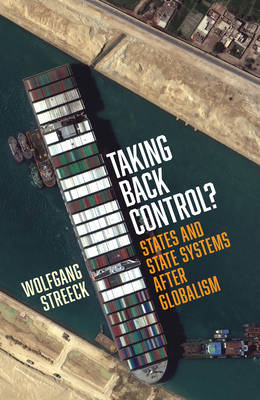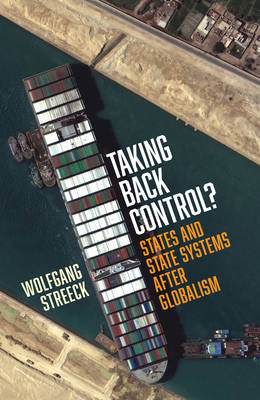
- Afhalen na 1 uur in een winkel met voorraad
- Gratis thuislevering in België vanaf € 30
- Ruim aanbod met 7 miljoen producten
- Afhalen na 1 uur in een winkel met voorraad
- Gratis thuislevering in België vanaf € 30
- Ruim aanbod met 7 miljoen producten
Zoeken
€ 37,45
+ 74 punten
Omschrijving
"This maverick thinker is the Karl Marx of our time...In recent decades, Mr. Streeck has described the complaints of populist movements with unequaled power. That is because he has a convincing theory of what has gone wrong in the complex gearworks of American-driven globalization, and he has been able to lay it out with clarity."
--Christopher Caldwell, New York Times Taking Back Control? examines the ongoing tug of war between the forces of globalism and those of democracy, between centralisation and decentralisation, and between the unification and the differentiation of states and state systems. On this territory are fought the defining geopolitical struggles of our era, which will determine the advance of global capitalism and shape the prospects for its social and democratic regulation. The neoliberal revolution of the 1990s gave rise to a politics of scale aimed at the centralisation and unification of states and state systems. This was the "New World Order" proclaimed by the United States in the wake of the Soviet collapse. But it proved to be ungovernable by democratic means. Instead, it was ruled through a combination of technocracy and mercatocracy, failing spectacularly to provide for political stability, social legitimacy, and international peace. Marked by a series of economic and institutional crises, hyperglobalisation called forward various kinds of political countermovements that rebelled against and ultimately stopped the upward transfer of state authority in its tracks. Exploring the possibility for states and the societies they govern to take back control over their collective fate, Wolfgang Streeck formulates a renewed theory of the state in political economy. Drawing on the work of Karl Polanyi and John Maynard Keynes, he discusses the potential outlines of a state system that allows for democratic governance within and peaceful cooperation between sovereign nationstates.
--Christopher Caldwell, New York Times Taking Back Control? examines the ongoing tug of war between the forces of globalism and those of democracy, between centralisation and decentralisation, and between the unification and the differentiation of states and state systems. On this territory are fought the defining geopolitical struggles of our era, which will determine the advance of global capitalism and shape the prospects for its social and democratic regulation. The neoliberal revolution of the 1990s gave rise to a politics of scale aimed at the centralisation and unification of states and state systems. This was the "New World Order" proclaimed by the United States in the wake of the Soviet collapse. But it proved to be ungovernable by democratic means. Instead, it was ruled through a combination of technocracy and mercatocracy, failing spectacularly to provide for political stability, social legitimacy, and international peace. Marked by a series of economic and institutional crises, hyperglobalisation called forward various kinds of political countermovements that rebelled against and ultimately stopped the upward transfer of state authority in its tracks. Exploring the possibility for states and the societies they govern to take back control over their collective fate, Wolfgang Streeck formulates a renewed theory of the state in political economy. Drawing on the work of Karl Polanyi and John Maynard Keynes, he discusses the potential outlines of a state system that allows for democratic governance within and peaceful cooperation between sovereign nationstates.
Specificaties
Betrokkenen
- Auteur(s):
- Uitgeverij:
Inhoud
- Aantal bladzijden:
- 416
- Taal:
- Engels
Eigenschappen
- Productcode (EAN):
- 9781839767296
- Verschijningsdatum:
- 19/11/2024
- Uitvoering:
- Hardcover
- Formaat:
- Genaaid
- Afmetingen:
- 155 mm x 236 mm
- Gewicht:
- 566 g

Alleen bij Standaard Boekhandel
+ 74 punten op je klantenkaart van Standaard Boekhandel
Beoordelingen
We publiceren alleen reviews die voldoen aan de voorwaarden voor reviews. Bekijk onze voorwaarden voor reviews.











